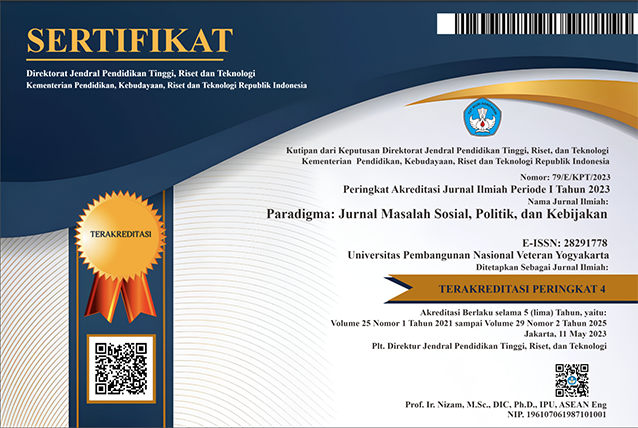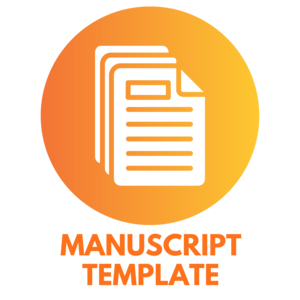DYNAMICS OF INDONESIAN - TIMOR LESTE RELATIONSHIPS: The Long Road of East Timor Towards an Independent State Through a Referendum in 1999
DOI:
https://doi.org/10.31315/paradigma.v22i2.6595Keywords:
Timor Leste, Dynamics, Neo realism, international structure, Cold War, IndependentAbstract
There are two main questions which has to be answered in this paper: first, how the
dynamics between Indonesia-Timor Leste relations since integrational process in 1976
year which has chose to separate up to be an independent state by referendum process in
1999; And secondly, why does Timor Leste become repettional issue of the international
politics?. This paper uses a neo-realism approach, which emphasizes the role of an
international structure on determining the behavior of states. According to neo-realist, the
role of the state is in fact passive and powerless, because the behavior of the state follows
the existing international structure. This research uses qualitative-descriptive method.
Data collection with in-dept interview as main data sources, and also uses written data
sources as secondary data such as books, journals, and internet media. The findings
suggest that the cold war had caused the “omission politics” of the big countries on what
happened in Timor Leste. As the cold war ended, major countries withdrew support for
indonesia and this led to the issue of Timor Leste being the main discourse in international
forums and eventually bringing Timor Leste into an independent state
References
Amaral, X. Naskah Proklamasi
Kemerdekaan RDTL 28 November
(1975).
Belo, U. C. (1996). Pidato Penerimaan
Hadiah Nobel Perdamaian.
CAVR. (2005). Chega: Sejarah Konflik.
Laporan Akhir CAVR (Bagian 3).
Retrieved from http://www.cavrtimorleste.
org/en/chegaReport.htm
Coelho, A. M. (2012). Dua Kali Merdeka
Esei Sejarah Politik TIMOR LESTE
(Cetakan I). Yogyakarta: Penerbit
Djaman Baroe.
Cruz, F. . L. (1999). Kesaksian Aku dan
Timor Timur. Jakarta: Yayasan
Tunas Harapan Timor Lorosa’e.
CSIS. (1992). Dokumentasi Kliping
Tentang KPN Peristiwa Dili 12
November 1991. Jilid I, CSIS,
Jakarta.
Dokumen Kesepakatan 5 Mei Tahun
(pasal 5).
Faisal, S. (1990). Penelitian Kualitatif:
Dasar-dasar dan Aplikasi. Malang:
Y.A.3.
Hill, H. M. (2000). Gerakan Pembebasan
Timor Lorosae. Dili: Sahe Institute
for Liberation dan Yayasan HAK.
KKP. (2008). PER MEMORIAM AD
SPEM: Laporan Akhir Komisi
Kebenaran dan Persahabatan
Indonesia - Timor Leste. Denpasar.
Liong, S. L. (1999). Timor Leste -
International Interest and Local
Players, Vol. II.
PBB. Resolution 1514 General Assembly
- Declaration on the Granting of
Independence to Colonial Countries
and People (1960).
Pidato Hadiah Nobel Perdamaian. (1996).
Retrieved from
http://nobelprize.org/peace/laureate
s/1996/presentation-speech.html
Published
How to Cite
Issue
Section
License
The manuscript submitted to Paradigma: Jurnal Masalah Sosial, Politik, dan Kebijakan journals are released under the license of Creative Commons Attribution-Non Commercial- ShareAlike (CC BY SA) if and when the article is accepted for publication.
We declare that:
- This paper has not been published in the same form elsewhere.
- It will not be submitted anywhere else for publication prior to acceptance/rejection by this Journal.
- A copyright permission is obtained for materials published elsewhere and which require this permission for reproduction.
Retained Rights/Terms and Conditions
Authors retain all proprietary rights to the published works, such as (but not limited to) the following rights:
- Copyright and other proprietary rights relating to the article, such as patent rights,
- The right to use the substance of the article in own future works, including lectures and books,
- The right to reproduce the article for own purposes,
- The right to self-archive the article
The right to enter into separate, additional contractual arrangements for the non-exclusive distribution of the article's published version (e.g., post it to an institutional repository or publish it in a book), with an acknowledgment of its initial publication in this journal Paradigma: Jurnal Masalah Sosial, Politik, dan Kebijakan




